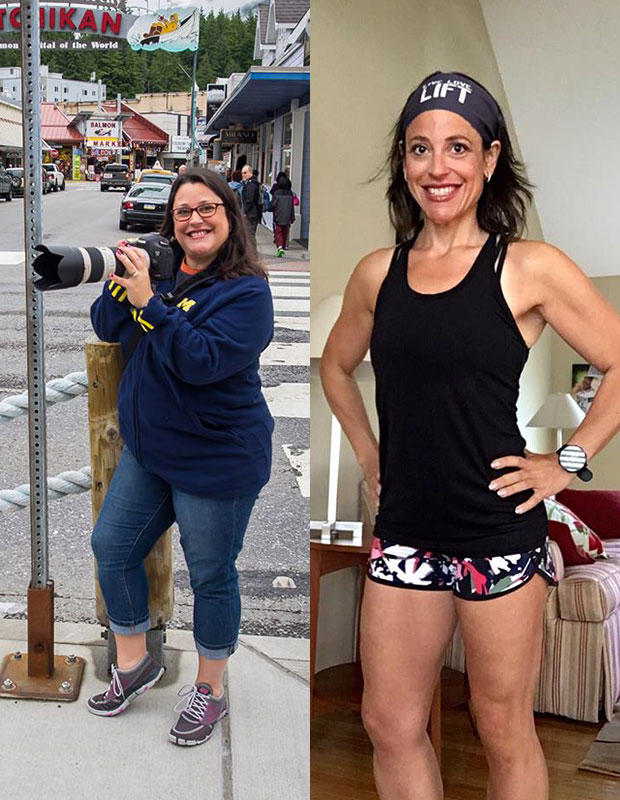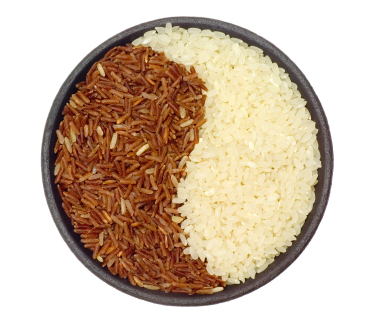The Anti-Diet: How Not Dieting Is the Key to Losing Weight
The Intuitive Eating Approach
Jill Carlson, 36, had issues with ice cream. So the Chicagoan, who had lost and regained 60 pounds through a series of different diets, did something drastic. Instead of following conventional weight-loss wisdom and banishing Ben & Jerry's Cake Batter from the house, she filled her freezer with it, stocking 10 pints and giving herself permission to eat it. At first she did — a lot. But after a couple of months the sweet treat sat untouched. "It lost its sparkle," she said. "I knew at that point that ice cream — or any food — no longer had an unhealthy grip on me."
Jill is among the growing number of women who are turning their back on typical diets. They're making peace with food and their weight, using what experts have dubbed a no-diet approach. Their ranks include Oprah Winfrey, who declared she would never diet again after reading Women, Food, and God by Geneen Roth, and Smash star Katharine McPhee, who credits this tactic for helping her recover from bulimia. These women practice what's called intuitive eating; that is, they eat only when hungry, they don't feel guilty about food, and they eat whatever their body tells them to. And it works: According to researchers at Brigham Young University, people who scored high on an intuitive-eating scale not only had less anxiety about food and got more enjoyment from eating but also had lower BMIs.
If you stop focusing so much on eating less, you'll actually eat less. It's a radical notion, but desperate times call for desperate measures. "For most people, dieting doesn't lead to weight loss that lasts," says Traci Mann, PhD, a professor of psychology at the University of Minnesota. In the most complete analysis of weight-loss studies to date, she found that most people regain all the pounds they dropped, and as many as two-thirds pack on even more. Not shocking, when you consider that chronic dieting can affect a person's psychology — for example, cause moodiness or preoccupation with food, says Janet Polivy, PhD, a professor of psychology at the University of Toronto. Dieters have a tendency to binge, both before their diet begins and after it fails.
Unfortunately you can't change how you view food overnight. "It's a journey," says Barbara Meyer, PhD, the program director of Green Mountain at Fox Run, a nondieting weight-loss retreat for women. "We've had distorted relationships with food for a long time; dieting disconnects you from how food makes your body feel." But with time, you can get to a better place. Just look at Jill's unconventional ice cream experiment. It's actually a well-known tenet of the no-diet approach, called habituation; Jill ended up dropping 50 pounds — without trying! "I'm eating healthier because I realize I have more energy and better digestion when I do," she says. "My relationship with food and my body is more peaceful, and the weight loss is just a side effect of that. That makes me feel really powerful."
Jill's success made us wonder, Can the habituation strategy work for anyone? Are there other no-diet techniques that sound like psychobabble but actually get results? We sent three women to the experts at the forefront of the movement to find out. The goal: to fix stubborn eating problems by trying anti-diet tactics for two weeks.
Anti-Dieting Strategies, Tested
"I can't keep cookies in the house."
Michelle Arteaga, 41, of Novato, California, wants to bake cookies with her kids. What's stopping her? Fear of gobbling up the whole batch. "I try to resist, but I end up eating them all," she admits. "I've even put cookies down the garbage disposal when I've felt really out of control. Why can't I eat just one or two like a normal person?"
Anti-diet strategy: Habituation Conventional weight-loss wisdom says that keeping trigger foods out of the house will keep them out of your mouth. But anti-diet proponents say just the opposite: that a food loses its power over you when it's available 24-7. "Some people actually discover they don't like it as much as they thought they did," says Evelyn Tribole, RD, the author of Intuitive Eating. To try this, keep your kryptonite in the house for two weeks. In Michelle's case, that meant stocking her cookie jar with homemade chocolate chip cookies at all times and baking a fresh batch whenever she ran low.
Real-world results: Michelle says: "I was sure I had an insatiable appetite for cookies. But the first time I gave myself permission to eat as many as I wanted, I was surprised that I was satisfied after just three. By day four the cookies were already less tempting. Now they don't seem as scary as they did before. Removing the danger sign helped me realize that they are just cookies and don't have special power over me."
"I overeat at meals."
Gabby Meyerson, 29, of New York City, is a lifelong member of the clean plate club. "I'm generally a healthy eater, but I love food. I often don't know when to stop," she says.
Anti-diet strategy: Pace eating "When we eat, we tend to consume the entire portion. This doesn't account for the fact that it takes some time for the brain to register that the stomach is full," says Pavel Somov, PhD, a psychologist in Pittsburgh and the author of Eating the Moment. "So we end up eating beyond the point of pleasant fullness." The following technique is the perfect solution: Divide your portion in half, eat the first half, and then set a timer for a five-minute break. Close your eyes, tune in to your body and ask yourself, Am I still hungry? Am I satisfied? Next, open your eyes and notice the moment: What do I smell? How does the remaining food look? Then, if you're still hungry, eat the rest of the food. If you're satisfied, don't. If you're full but yearn for another taste, have a slow, mindful one.
Real-world results: Gabby says: "At first it was strange to just sit there with food in front of me, especially when I ate with my husband. But I got used to checking in with my body instead of automatically cleaning my plate. Turns out, I need much less food than I thought. Sometimes I'm full after the five-minute break, and I don't eat any more. Now I actually enjoy my meals instead of inhaling them. I'm eating less overall, and my pants feel a bit looser."
"I multitask while eating."
Busy bee Amanda Betts, 28, of Vancouver, British Columbia, is always doing several things at once. "While I eat, I may be texting, working on my computer, reading, or watching TV," she says. "Even right after a meal, I often feel dissatisfied and still hungry."
Anti-diet strategy: Silent meal Once a week, guests at the Green Mountain weight-loss retreat have a 40-minute meal with no conversation, music, or distraction of any kind. The theory is that when you quiet external noise, it's easier to hear your internal hunger and satiety cues. "It's a profound eye-opener for many women, because they realize they don't listen to their bodies when they eat," says Meyer. Here's a quick how-to: First, warn your family so they won't think you're mad at them. Then, unplug from technology. Set a timer to go off every few minutes as a reminder to pause and check in with yourself; put down your fork and take a few mindful breaths, noticing if you're satisfied or still hungry. From there, decide whether or not to stop eating.
Real-world results: Amanda says: "I usually eat dinner with my boyfriend. Eating in silence was a bit weird because we're so used to chatting at supper. But when I tried it alone and focused on the food — how it tasted, what it looked like, and how full or hungry I was — I noticed that it seemed more flavorful, and it was easy to tell when I was satisfied. I still do a silent meal occasionally; my boyfriend does too. Even when I'm out with friends, I eat a lot less now because I check in with myself about whether I'm full."
Start Anti-Dieting
These four simple strategies will help you get started with the anti-diet. Sure, they seem to go against everything you've heard about weight loss, but experts say that's exactly the point.
Use your senses.
Employing all five senses, not just taste, when you eat is an easy way to be more mindful. "This gives you more pleasure from your food, so you end up being more satisfied," says Lilian Cheung, a Harvard School of Public Health lecturer and a coauthor of Savor: Mindful Eating, Mindful Life. Stop eating on autopilot and relish each bite. Look at the colors on your plate and inhale the aroma. Listen to the sizzle of that stir-fry or the crunch of the carrots. Enjoy the texture of that creamy Greek yogurt.
ID your hunger.
"Give yourself unconditional permission to eat when you're hungry," says Evelyn Tribole, RD, the author of Intuitive Eating. But be sure it's the stomach-rumbling, physical kind. Ask yourself, "What am I hungry for?" If you're bored, sad, or feeling celebratory, it's not food that you're craving.
Table the labels.
Research in the journal Appetite revealed that one in four dieters, as opposed to one in 25 nondieters, labels foods with the words guilt or no guilt. Part of what drives you to overeat ice cream or chips is a fixation on the allure of bad foods, says psychoanalyst Carol Munter, a coauthor of Overcoming Overeating. Try to view all foods as being equal. This takes practice, Munter says, so remind yourself of your new mind-set when you catch yourself thinking Brownie equals bad, and grape equals good.
Slow down.
Instead of inhaling your dinner, sit at the table while you eat and make the meal last at least 20 minutes. When you go slow, it's easier to read your body's hunger and fullness signals. Need proof? In a study published in the Journal of the American Dietetic Association, women consumed less, yet reported feeling fuller, when they put down their utensils between bites and chewed each mouthful 20 to 30 times.
Originally published in FITNESS magazine, March 2013.
-
Let Us Now Look At A Quick Weight Loss Tips
Obesity is a killer, is a silent killer. This is a very long period o
-
How to Detox Your Body
On an every day basis, you can make changes in your diet and env
-
10 Tidbits of Weight-Loss Wisdom from The Biggest Loser
I Am The Biggest Loser? I claim the title The Biggest Loser. Not becau
-
Take A Healthy Approach To Your Weight Loss
TIP! Have a journal to track your daily calorie intake. If yo
-
How To Prevent A Binge Before It Starts
Photo by PLAINVIEW/Getty ImagesWeve all been there. Despite that green
-
Wonderful Weight Loss Advice That Really Does Work
Do you want to lose weight? If you are like most people, the answer i
- DON'T MISS
- 5 Surprising Foods That Can Help You Lose Weight
- Dr Phil Settles
- Need Weight Loss Advice? Read This Article!
- 7 Exercises to Trim and Tone Your Thighs At Home
- Top Heart Healthy Foods
- Are You Too Old to Lose Weight?
- How to Lose Fat
- Say Goodbye To Emotional Eating
- Dieting Doesnt Work
- How to Lose 10 Pounds in One Week




